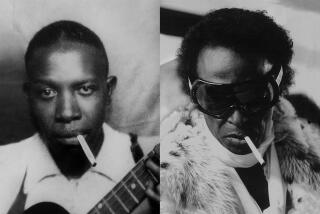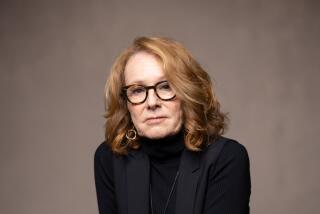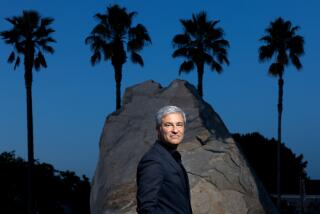Judge Questions Ownership of Hammer Art
A Delaware judge has questioned the ownership of the art collection of Occidental Petroleum Corp. Chairman Armand Hammer and concluded that “the most unusual and troubling circumstances” surround resolution of a lawsuit over establishment of an Occidental-financed museum in Westwood for Hammer’s artworks.
The observations by the judge, Vice Chancellor Maurice Hartnett, are contained in a decision--made public Thursday--turning down a request by a dissident Occidental shareholder for an injunction to block a settlement in litigation over Occidental’s funding of the museum.
Hartnett said that while the injunction sought by New York investor Alan R. Kahn would be premature, details that have emerged in the litigation about financing of what would be called the Armand Hammer Museum and Cultural Center indicate there are half a dozen “troublesome issues” that raise questions about Occidental Petroleum’s role in financing it.
The questions, Hartnett said in his order, involve not only the dispute over the Hammer museum, but Hammer’s past relationship with the Los Angeles County Museum of Art, to which Hammer had originally promised his extensive art collection.
Early last year, Hammer canceled the agreement after county museum officials balked at a series of demands made by Hammer for everything from life-size portraits of him and his wife in the gallery to a guarantee that the museum would exhibit his collection together in perpetuity--never including works other than those he had donated.
In the decision, Hartnett said that the stockholder lawsuit’s troublesome elements include “the issue of who really owns the art” whose donation Hammer withdrew from the county museum, as well as “the egocentric nature of (Hammer’s) objections to the Los Angeles County museum being the recipient of his donation.”
Hartnett’s focus on the actual ownership of Hammer’s art collection paralleled questions raised within the Los Angeles art community for several years over whether, in a technical sense, Occidental Petroleum money may have been used to purchase at least some pieces in the collection, which has an estimated value of about $250 million.
In a statement issued Thursday morning at Occidental’s Westwood headquarters, where a meeting of the company’s board of directors was in progress, the firm said only that “we’re pleased the Delaware court has denied the preliminary injunction.” The Hammer museum, which is under construction, will be connected to the Occidental building.
Occidental spokesman Frank Ashley said the company would not respond to Hartnett’s recitation of the series of “troublesome issues,” and Ashley said specifically that Occidental would not comment on questions about ownership of the Hammer art collection.
Hartnett’s harsh criticisms of the settlement agreement and events leading up to it--particularly circumstances under which Occidental gave apparently preferential treatment to one set of attorneys and ignored Kahn’s lawyer--did not constitute a final decision in the case. But lawyers familiar with such matters said the tone of Hartnett’s ruling on the injunction indicated that Occidental may have extreme difficulty getting final court approval of the settlement proposal.
The court order raised other questions as well. Hartnett said that the shareholder action raised concerns about “the now worthlessness of a prior donation by Occidental” to the county museum--but the court order did not identify the transaction to which the judge referred.
County museum officials--including Daniel Belin, an attorney and president of the museum’s board, and Earl Powell, the museum’s director--said they were puzzled by what Hartnett could have meant.
Interpretation of Hartnett’s decision was complicated by the existence of a secrecy agreement in the litigation that has placed a total seal on all documents in the case. Attorneys involved are also barred from commenting on the case in public.
The secrecy order, signed by Hartnett last month, cites concern that records of Occidental’s financing of the museum contain “trade secrets or sensitive commercial, financial or proprietary business information.”
The order denying the injunction was the latest development in a complex court fight in which two separate lawsuits have been filed--one by Kahn and the other by two additional dissident stockholders--in an attempt to stop Occidental from spending as much as $86 million to construct and subsidize the Hammer museum.
Last month, a tentative settlement was reached in the second suit, filed by shareholders Joseph Sullivan and Alan I. Brody, in which Occidental agreed to limits on donations it can make to charities associated with Hammer. Kahn has objected to the settlement, claiming it doesn’t effectively reduce the money Occidental can turn over to Hammer organizations and that lawyers who filed the suit were rewarded by Occidental with $1.4 million in fees.
The decision by Hartnett, which was signed Wednesday night in Dover, Del., permits Occidental to complete a formal draft of the settlement agreement. Another court hearing will be held at a date yet to be set to decide on objections by Kahn and other stockholders who object.
Hartnett’s order also said the proposed settlement “is certainly subject to criticism” because:
- Occidental’s board agreed to the museum financing scheme without consulting its own attorneys.
- The agreement provides for “huge attorney fees” to which both Occidental and some dissident shareholders agreed not to object.
- The settlement is characterized by a “lack of any direct substantial benefit to the stockholders.”
More to Read
The biggest entertainment stories
Get our big stories about Hollywood, film, television, music, arts, culture and more right in your inbox as soon as they publish.
You may occasionally receive promotional content from the Los Angeles Times.










